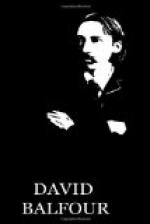“O, you! you are not alone,” I replied. “But since I went off I have been dogged again, and I can give you the name of him that follows me. It is Neil, son of Duncan, your man or your father’s.”
“To be sure you are mistaken there,” she said, with a white face. “Neil is in Edinburgh on errands from my father.”
“It is what I fear,” said I, “the last of it. But for his being in Edinburgh I think I can show you another of that. For sure you have some signal, a signal of need, such as would bring him to your help, if he was anywhere within the reach of ears and legs?”
“Why, how will you know that?” says she.
“By means of a magical talisman God gave to me when I was born, and the name they call it by is Common-sense,” said I. “Oblige me so far as to make your signal, and I will show you the red head of Neil.”
No doubt but I spoke bitter and sharp. My heart was bitter. I blamed myself and the girl and hated both of us: her for the vile crew that she was come of, myself for my wanton folly to have stuck my head in such a byke of wasps.
Catriona set her fingers to her lips and whistled once, with an exceeding clear, strong, mounting note, as full as a ploughman’s. A while we stood silent; and I was about to ask her to repeat the same, when I heard the sound of some one bursting through the bushes below on the braeside. I pointed in that direction with a smile, and presently Neil leaped into the garden. His eyes burned, and he had a black knife (as they call it on the Highland side) naked in his hand; but, seeing me beside his mistress, stood like a man struck.
“He has come to your call,” said I; “judge how near he was to Edinburgh, or what was the nature of your father’s errands. Ask himself. If I am to lose my life, or the lives of those that hang by me, through the means of your clan, let me go where I have to go with my eyes open.”
She addressed him tremulously in the Gaelic. Remembering Alan’s anxious civility in that particular, I could have laughed out loud for bitterness; here, sure, in the midst of these suspicions, was the hour she should have stuck by English.
Twice or thrice they spoke together, and I could make out that Neil (for all his obsequiousness) was an angry man.
Then she turned to me. “He swears it is not,” she said.
“Catriona,” said I, “do you believe the man yourself?”
She made a gesture like wringing the hands.
“How will I can know?” she cried.
“But I must find some means to know,” said I. “I cannot continue to go dovering round in the black night with two men’s lives at my girdle! Catriona, try to put yourself in my place, as I vow to God I try hard to put myself in yours. This is no kind of talk that should ever have fallen between me and you; no kind of talk; my heart is sick with it. See, keep him here till two of the morning, and I care not. Try him with that.”




